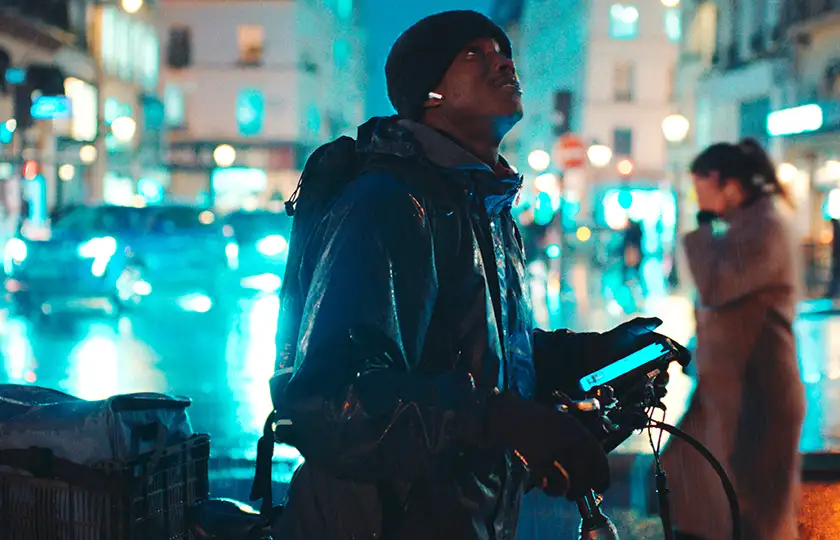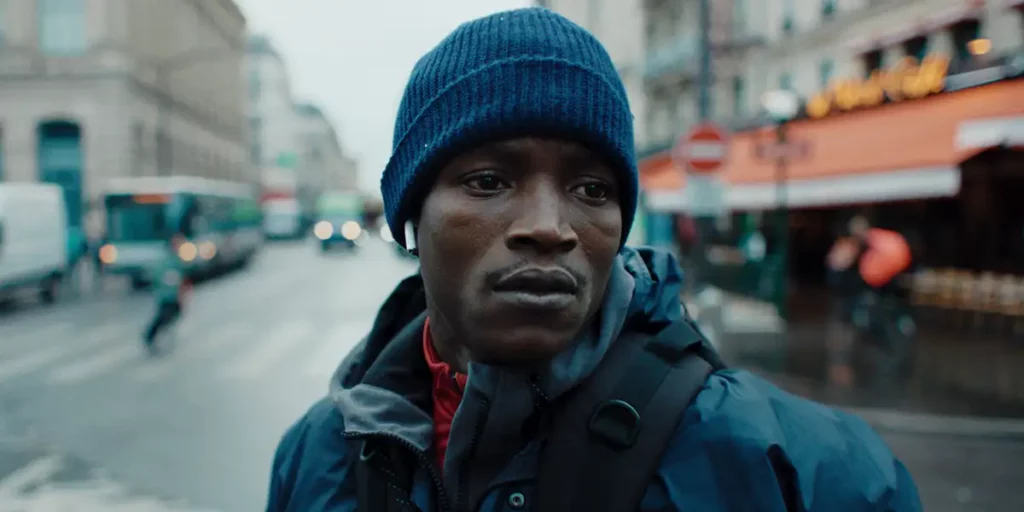Compassionate realism is the crux of Boris Lojkine’s Souleymane’s Story, an effective, if repetitive, drama exploring a young man seeking asylum.
Director: Boris Lojkine
Genre: Drama
Run Time: 93′
Language: French with English subtitles
Cannes Premiere: May 19, 2024
U.S. Release Date: August 1, 2025
U.K. Release Date: TBA
Where to Watch: At Film at Lincoln Center and IFC Center (New York)
Granting asylum is, by its very definition, something done with an element of compassion. And it feels like that is the sentiment with which Boris Lojkine approached Souleymane’s Story (L’histoire de Souleymane), a film centred around the idea of seeking opportunity by all available means. The writer-director researched the stories of the undocumented bike couriers he saw throughout Paris and weaved them into a single character drama about the murky process of obtaining asylum in France. It’s a film that doesn’t shy away from unpleasant realities, but also isn’t seeking to villainise those on either side of the process.
Souleymane (Abou Sangare) is two days away from the interview which will determine whether his asylum application is successful or not. As he bikes around Paris delivering takeaway food, he practices the tried-and-tested story he’s been given by fellow Guinean Barry (Alpha Oumar Sow). But as the interview time grows ever closer, Souleymane’s nerves start to get the better of him, and he wonders whether he can pull off what is expected of him.
There’s both a freneticism and a simplicity to Lojkine’s film. As Souleymane weaves through the chaotic Parisian traffic on his deliveries, Tristan Galand’s camera follows just behind him, as eager to keep up as Souleymane is to complete as many orders as he can. But it also lingers on the quiet moments too, in those precious breaks when Souleymane is grabbing a hot drink or taking an exhausted breath on the bus back to his shelter. Souleymane’s Story isn’t doing a lot, narratively speaking, but it is giving its audience a glimpse into a young man’s life as he approaches a potentially pivotal moment.
Souleymane is constantly rehearsing for his interview, replaying voice memos and repeating key dates and names for his fictional backstory. But he’s struggling to remember everything, growing increasingly nervous and desperate as interview day looms ever closer. Souleymane clearly isn’t ready, he’s barely treading water and not yet equipped to swim, but time is running out. There are glimpses of his genuine nature – like when he patiently helps an older customer and remains grateful to those who help him in return –, but Lojkine never loses sight of the fact that Souleymane is a man preparing to officially lie.

Crucially though, Souleymane’s Story isn’t looking to cast a moral judgement on that decision. It’s simply presenting it as a reality. There’s a world in which a version of this film exists wherein Souleymane encounters all the bad luck imaginable, a world in which the filmmaker heaps misery onto a man already living an incredibly difficult life. But that isn’t the care here. Instead, Lojkine – and fellow writer Delphine Agut (Inshallah A Boy) – have imbued the film with so much compassion and invaluable research that it translates into the audience feeling not pity or disgust for Souleymane, but rather empathy. It feels rooted in truth, keen to show the grey areas of contemptuous issues like seeking asylum and to simply encourage a young man who is so desperately trying to make a better life.
It’s a very intimate film, with Sangare very rarely leaving the screen. His presence is really beguiling, and although a lot of time is spent in relative silence, there’s so much to his physicality that invites the audience to want to understand him. The last fifteen minutes of the film are perhaps the best showcase for Sangare’s burgeoning talent, with the transition from Souleymane telling a story to telling his story very effectively handled. It’s subtle but poignant, and Lojkine treats both Souleymane and Sangare with dignity as Galand’s camera cuts away to allow for moments of composure, before resuming a slow pan towards Souleymane’s face as he finally unburdens himself. It’s perhaps the film’s stand out sequence, and Nina Meruisse’s interviewer is almost a stand-in for the audience itself, listening attentively and casting aside any aspersions or judgements.
The whole film is simply a slice-of-life tale, following Souleymane’s daily routine as he works and flits around a community often deliberately placed at the fringes of society. It’s simultaneously well-paced, in that it effectively highlights the relentlessness of Souleymane’s life since arriving in France from Guinea, and also frustratingly over-detailed.
While the former feels like a curated choice, the latter means that, as a viewing experience, the film does drag in the middle as sections begin to feel a little repetitive. For the most part, The Story of Souleymane’s content is very effective, but perhaps an even tighter edit would have made the whole film as impactful as that final sequence is.
Souleymane’s Story is Boris Lojkine’s glimpse into the more mundane – and yet still incredibly important – parts of the migrant experience. It’s a film that isn’t looking to offer resolution or moral judgements, but rather invite discussion and highlight truth. While some may find that frustrating, it’s very much in keeping with the film’s consistent realism. It isn’t trying to offer a story that is sanitised or sensationalised, and Lojkine isn’t interested in melodrama or embellishment. Instead, it’s giving Souleymane – and the countless others like him – the opportunity to tell his story, should he choose to take it.
Souleymane’s Story premiered at the Cannes Film Festival on May 19, 2024, where it won the Un Certain Regard Jury Prize, the FIPRESCI Prize, and the Un Certain Regard Prize for Best Actor. The film will open at Film at Lincoln Center and IFC Center (New York) on August 1, 2025.

